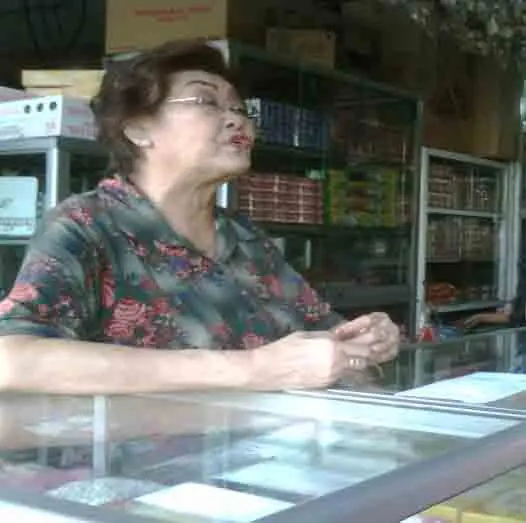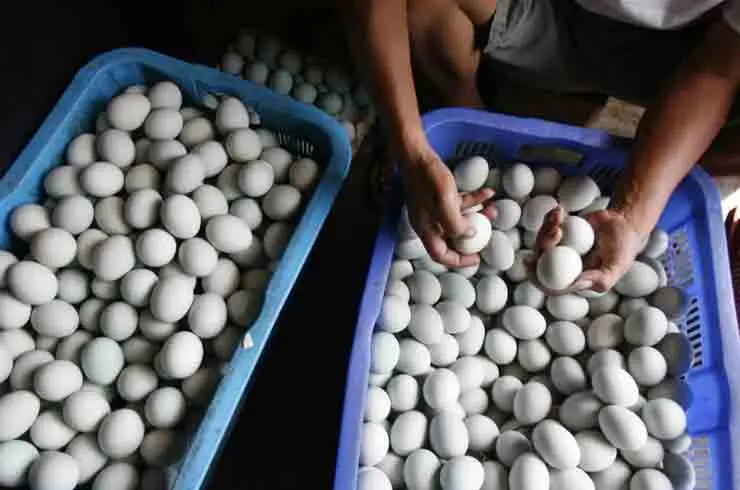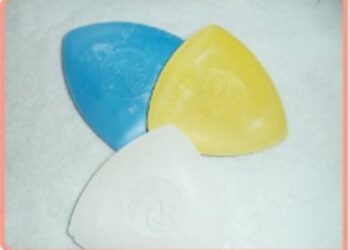DEVELOPMENT OF SALTED DUCK EGG INDUSTRY IN BREBES 1980-2005
A .Development of Salted Duck Egg Industry
In Brebes sub-district itself there are many duck farms. In ancient times, the population nurtured ducks traditionally by herding in rice fields and rivers. In the rice growing season is done in a caged and in the harvest season in the umbar on rice fields. They used duck eggs to make salted eggs, from which it can be concluded that salted eggs developed around the 1970s and began to develop rapidly around the 1990s.

In terms of marketing initially salted eggs are peddled very simply, namely by means of being peddled from home. The traders are traveling around delivering eggs. At first this salted egg is produced to order. There has been no courage to open a specialty store selling salted eggs, let alone expand its trading business. This is due to the unstable economic condition of In Tjiauw Seng.
In late 1970, the salted egg business began to be carried out by brebes native Muhadi in limbangan wetan village. He learned to make salted eggs while working at Setuju Jaya, in late 1970 Muhadi left Setuju Jaya and tried to establish his own salted egg industry with the help of three workers. Since then, other salted egg business units have sprung up in the surrounding village.
The entrepreneur did not miss the opportunity by increasing the amount of production and processed taste. The entrepreneur seeks to increase sales turnover and introduce the salted egg industry in brebes, by conducting activities promoting salted egg products from Brebes. Promotion is done through brand inclusion, making advertisements on the radio and from the news so that salted eggs from Brebes become known by the public and successfully enter the market.
Table
Indication of The Rapid Growth of Salted Egg Industry of Brebes and Wetan Villages, Based on The Number of Industries in 1970-2005
|
Year |
Number of Craftsmen |
Total Production (Year) |
Workers |
|
1970s |
20 |
– |
60 |
|
1980s |
54 |
10.108.500 eggs |
200 |
|
1990s |
65 |
11.524.000 eggs |
260 |
|
2000s |
45 |
12.075.000 eggs |
178 |
Read also : Development of Salted Duck Egg Part 1 and Part 2
B. Creativity and Innovation Developed by Salted Egg Industry Entrepreneurs
1. Production Process
Entrepreneurship is a fairly popular phenomenon these days, and allows it to become a new pattern and order in people’s lives, and for certain parties it is a new thing that requires special education. The business world is a world of risk and uncertainness, which is between success and failure easily and quickly. In anticipation of this, good education and entrepreneurial knowledge is needed.
The salted egg industry is a small industry located in the middle of the community in Brebes Sub-district that further accentuates creativity in producing salted eggs. This is because the products produced in this industry are salted eggs that are a type of processed product from duck eggs that quickly rot if stored for too long. This condition that causes the players of the salted egg industry is required to be able to be creativity by creating various variations of processed flavors.
2. Raw Material Procurement System
The production of salted eggs depends heavily on the raw material of duck eggs. This raw material is obtained from duck farm centers in Brebes, Cirebon, Indramayu and Tegal. According to Komarudin duck eggs from Tegal the quality is better when compared to duck eggs originating from Brebes. The purchase of complementary materials such as ash, red brick, ground ladon salt, kerosene and so on applied the buying system broke up even though the purchase was made in large quantities. These complementary material baskets are red brick making businesses located in Pesantunan and Pebatan Kabupaten Brebes.
Read also : Development of Salted Duck Egg Part 1 and Part 2
C. Marketing System Conducted by Salted Egg Industry Entrepreneurs
Marketing has a very important role in business activities. In the absence of marketing products produced by the company will not get into the hands of consumers. Marketing is a very important aspect for a company. Through proper marketing, an item can reach consumers quickly. Marketing plays a pretty important role in increasing the number of sales, a high number of sales will result in a high profit.
Indirect marketing has an advantage in terms of ordering products where the number of requests is more and the production process must also be improved. In addition to being indirectly able to attract fans who are from outside the area to stop by when in Brebes City, but the shortcomings in terms of payments that are not always cash but use in the form of a giro or cheque, plus the price given to the city is cheaper. The payment system made between the entrepreneur and the buyer can be done by cash system, advance purchase (panjer) and installment.
- Payment by cash is generally made if the consumer buys directly to the manufacturer or kiosk owned by the manufacturer. This is because consumers generally buy in relatively small quantities (<50).
- Payment by tasting is made for regular purchases made by retailers and large merchants. Employers receive money from retailers 2-4 times a month at a time when retailers are picking up salted eggs. The amount of money paid depends on the agreement between the entrepreneur and the retailer or the big merchant.
- Payment with a down payment system (panjer) is often made at the time of increased purchase during school holidays, holidays and the end of salted eggs.
Table
Average Price of Salted Eggs
|
Years |
1980 |
1984 |
1990 |
2000 |
2005 |
|
Price per item |
Rp. 50,- |
Rp. 85,- |
Rp. 125,- |
Rp. 500,- |
Rp. 869,- |
|
Price of rice per Kilogram |
Rp. 198,- |
Rp. 330,- |
Rp. 525,- |
Rp. 2.425,- |
Rp. 3.478,- |
The table above shows that the price of salted eggs has changed marked by rising prices. This is in adjusted to the price of rice ingredients in that year. The peak sales of salted eggs occurred ahead of and after the eid al-Fitr and Eid al-Adha celebrations. This is related to the habit of returning home and also halal bihalal so that generally consumers want to bring salted eggs as a typical food from brebes city.
With the large number of requests, the salted egg industry continues to increase in both production and marketing. This can be seen in 1996, the marketing area of the salted egg industry spread that was only in Brebes, Tegal but can now be to Batam, Semarang, Jakarta, Surabaya and Cirebon.
















